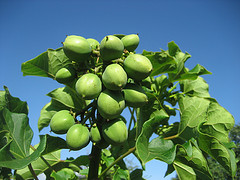
How long would you say biofuels have been around? 20 to 30, even 50 years? They're actually older than all of us! The idea started to brew back in the late 1800s, and one of the first applications, thanks to Rudolf Diesel (yes, the inventor of Diesel fuel), was running an engine on peanut oil. Unfortunately for biofuels, however, the discovery of petroleum came onto the scene soon after, causing the idea to die down.
Over the years it would enter and reenter the limelight with the help of the Clean Air Act by the Environmental Protection Agency in 1970, and amendments thereafter regulating emission standards for pollutants. However, it only started to be considered as a serious candidate once the consequences surfaced, as did the physical limitations of naturally occurring oils.

Struggling with high-priced oil imports and attempting to lessen our carbon footprint, a variety of biomasses have been considered for sources of alternative energy--corn, wood chips, sugar cane, and algae, to name a few. Along with exploring various feedstocks, more efficient methods of producing these biofuels have also been explored.
These innovative and ground-breaking efforts have led to the first trans-Atlantic commercial flight powered partly by biofuel. The flight wasAeromexico's Boeing 777, which flew more than 250 passengers from Mexico City to Madrid. The plane made the journey on a mixture of 55 tons of conventional aviation fuel and 20 tons of fuel made from the plant Jatropha Curcas. This shows a promising future since Aeromexico plans to start using the more environmentally friendly jatropha mixture on weekly flights between Mexico and Costa Rica. Read more about it here.

Biofuels have come a long way, from Diesel's first showcase of peanut oil to fueling a transatlantic flight. These efforts can be further developed to help make an even bigger and better impact. This initiative, coupled with strong institutional support, has the potential to rid of all the current doubts and issues that surround this option. Great strides have been made, but even greater ones are await.



Comments
I agree, safety is always key. For those who are interested in taking this awareness training course feel free to check out AIChE's eLearning Center. The course is called Process Safety for Biofuels, found here: <a href="http://aiche.learn.com/learncenter.asp?id=178411" rel="nofollow">http://aiche.learn.com/learncenter.asp?id=178411</a>.